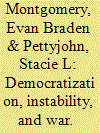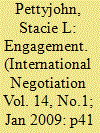| Srl | Item |
| 1 |
ID:
098792


|
|
|
|
|
| Publication |
2010.
|
| Summary/Abstract |
In 2006 Israel resumed military operations in the Gaza Strip and conducted a war in Lebanon following attacks by Hamas and Hezbollah, respectively. Due to the elections that had recently taken place in the Palestinian territories and Lebanon, these events seem to support the argument that democratizing nations are particularly war-prone. Yet the dynamics this perspective identifies as dangerous were largely absent. To address this puzzle, this paper offers three arguments. First, democratization enhanced the power of groups openly hostile to Israel, increasing Israel's perception of threat. Second, democratization was threatening because it occurred within highly divided societies governed by weak state institutions that allowed radical groups to attain political power. Finally, Israel's response to the increased threat posed by these groups was ultimately counterproductive because it further eroded the capacity of the Palestinian and Lebanese governments, heightened polarization within both societies, and therefore exacerbated the same conditions that made democratization threatening to begin with.
|
|
|
|
|
|
|
|
|
|
|
|
|
|
|
|
| 2 |
ID:
087303


|
|
|
|
|
| Publication |
2009.
|
| Summary/Abstract |
This article argues that under certain conditions the United States can play an important role in peacefully resolving a conflict involving an ally and a nationalist terrorist organization (NTO) by engaging the NTO. An American policy of engagement can bring both parties to the table by convincing them that they are trapped in a mutually hurting stalemate and that negotiations offer the only way out of this situation. In addition, engagement provides the U.S. with significant leverage over both of the disputants, enabling it to push both parties to make the concessions necessary to realize a settlement. However, engagement can only have these effects if the U.S. bias towards its ally is tempered and if its policy is serious, sustained, and conditional. For these conditions to hold, there must be significant domestic support within the United States for a policy of engagement. These arguments are illustrated with case studies of the U.S. engagement of Sinn Fein between 1994 and 2005 and the U.S. dialogue with the Palestine Liberation Organization between 1988 and 1990.
|
|
|
|
|
|
|
|
|
|
|
|
|
|
|
|
| 3 |
ID:
183258


|
|
|
|
|
| Summary/Abstract |
The US military rightly focuses on a Taiwan-invasion scenario for force planning, but to understand the odds of Sino-American war a range of scenarios must be examined. Consideration of five scenarios suggests that none of the wars that China might intentionally start are very attractive from Beijing’s perspective, providing the United States and its allies with time to strengthen deterrence. The greatest risk of a Sino-American conflict in the near term is inadvertent or accidental escalation caused by misperception or miscalculation. As the United States takes steps to bolster deterrence and reduce the risks of deliberate war, it must simultaneously put in place crisis-management mechanisms to prevent inadvertent or accidental escalation.
|
|
|
|
|
|
|
|
|
|
|
|
|
|
|
|